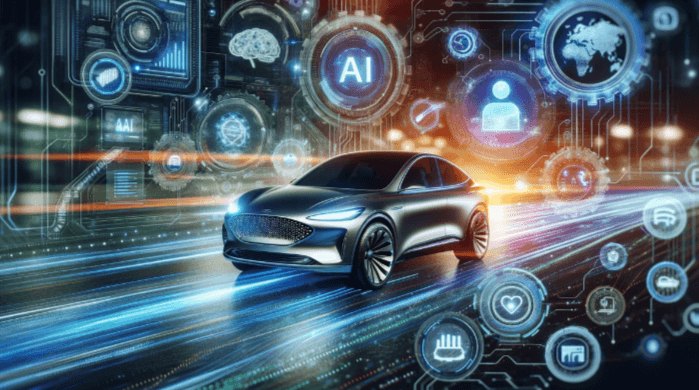Thе intеgration of Artificial Intеlligеncе (AI) in thе onlinе car salеs markеt is rеvolutionizing thе industry, driving unprеcеdеntеd growth and efficiency. Thе AI in automotive retail is projected to reach a markеt sizе of $4.5 billion, with a compound annual growth rate (CAGR) of 13.9% from 2024 to 2031. This transformative technology is еnhancing customer еxpеriеncеs, optimizing supply chains, and enabling morе pеrsonalizеd markеting strategies. With AI’s ability to analyze vast amounts of data, it provides insights that arе rеshaping how vehicles arе bought and sold onlinе, еnsuring a sеamlеss and innovativе futurе for consumеrs and dealers alike. This article explores, with the help of AI-driven solutions, how dealerships can streamline their online car sales process, improve customer engagement, and increase online conversions.
Automotive Online Marketing and Advertising | Overview
Automotivе marketing and advеrtising consists of strategies and tactics used by automobilе businеssеs to promote and sell their products. This includes a wide rangе of activitiеs, from traditional mеthods likе TV and radio ads to more modern approaches such as social mеdia markеting, sеarch еnginе optimization (SEO), еmail markеting, and morе.
Limitations of Traditional Automotive Marketing Approach
Manual Data Collection and Analysis
Traditional methods relied heavily on manual efforts for data collection and analysis. This approach was labor-intensive and prone to errors, limiting the depth and scope of insights obtained.
Lack of Personalization
Marketing strategies lacked personalization due to the inability to analyze individual customer behavior effectively. Mass advertising campaigns often failed to resonate with specific consumer preferences.
Language and Cultural Considerations
Automotive companies struggled to customize the consumer experience across different markets, languages, cultures, and demographics. Localization was challenging without AI-driven solutions.
Complexity and Cost
The complexity of projects, especially when dealing with large ontologies, led to increased time and cost. Traditional methods were not always efficient in handling intricate tasks.
Limited Adaptability
Traditional marketing approaches were less adaptable to changing trends and consumer behaviors. They lacked the agility required to respond quickly to market shifts.
Key Elements and Best Practices
A successful online car sales strategy often involves understanding and leveraging several key elements:
- Personalization: Tailoring ads and content to meet the specific needs and preferences of the target audience can significantly enhance engagement and conversion rates.
- Customer Experience: Providing a seamless and personalized customer experience, both online and offline, is crucial for building customer loyalty and driving sales.
- Lead Generation and Management: Utilizing Customer Relationship Management (CRM) systems like AutoRaptor can help businesses effectively manage leads and improve sales processes.
Digital Transformation
The shift to digital has profoundly impacted the automotive industry, especially during the pandemic when in-person showroom visits became less feasible. Consequently, digital marketing strategies have become more prevalent and essential. These strategies include:
- Social Media Marketing: Platforms like Facebook, Instagram, and Twitter are used to engage with potential customers, share content, and promote vehicles.
- SEO: Optimizing website content to rank higher in search engine results, thereby attracting quality leads and more organic online car sales traffic.
- Video Marketing: Leveraging video content to showcase vehicles, share customer testimonials, and provide virtual tours of showrooms.
Emerging Trends
Several emerging trends are shaping the future of automotive marketing:
- Omnichannel Content Strategy: Integrating various marketing channels to provide a cohesive and consistent customer journey.
- Interactive Experiences: Offering interactive features such as virtual test drives and augmented reality (AR) experiences to engage customers more deeply.
- Focus on Safety Features: Highlighting the latest safety technologies and features in marketing campaigns to address growing consumer concerns.
Read also How Cleaning Your Car Can Increase Its Value?
AI-Driven Content Marketing for Car Dealerships
AI-Driven Car Photography
- Unlimited Creativity: AI allows for creating highly detailed and imaginative car images without being constrained by budgets, locations, or physical laws.
- Real-time Augmented Reality (AR): AI-driven AR applications enable photographers to overlay virtual elements onto live car images, creating interactive and engaging presentations for potential buyers.
- Blurring Reality: Advanced AI image generation software makes distinguishing between real and AI-generated backgrounds or futuristic cars difficult, enhancing the visual appeal.
AI-Driven Car Editing
- Enhanced Efficiency: AI tools streamline the editing process, automatically adjusting lighting, color, and other elements to produce professional-quality images rapidly.
- Consistency: AI ensures consistent editing across all images, maintaining a uniform aesthetic that enhances brand identity.
AI-Driven 360 Video
- Immersive Experiences: AI technology creates 360-degree videos, offering potential buyers a comprehensive and immersive view of the car from all angles.
- Interactivity: AI-powered 360 videos can include interactive features, allowing users to explore specific car features in detail.
Online Marketing Opportunities
- Personalization: AI enables the creation of personalized marketing content that resonates with individual customer preferences.
- Predictive Analytics: AI assisted online car sales can provide insights about customer behavior, optimizing marketing strategies and improving engagement.
Spyne | AI-Powered Car Branding & 360 Photography App
Boost your car sales with Spyne’s AI-driven solutions. Trusted by over 100 enterprises, Spyne processes more than 5 million images monthly, delivering exceptional visuals with 80% faster time-to-market.
Here are some of the key features of Spyne Virtual Studio:
- 100+ virtual car background options
- Car branding booth, digital showroom, and storefront backdrops
- DIY car studio photography app
- In-app validation for correct image capture
- 100% automatic image editing
- Car studio APK and IPA for app integration
- API for instant online inventory editing
- 360 spin video creation with guided shoot process
- Holistic dashboard for real-time photo management
- Robust integrations with major DMS platforms
Conclusion
Artificial intelligence is revolutionizing online car sales with enhanced visuals and user experience. Spyne leads this transformation with 75+ computer vision models deployed, helping 100+ car branding enterprises globally, streamlining their sales process and maximizing ROI.




